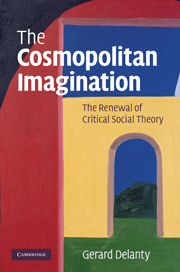Book contents
- Frontmatter
- Contents
- Preface and acknowledgements
- Introduction
- 1 The rise and decline of classical cosmopolitanism
- 2 Contemporary cosmopolitanism and social theory
- 3 Global ethics, solidarity and the problem of violence
- 4 Cosmopolitan citizenship and the post-sovereign state
- 5 Multiculturalism from a cosmopolitan perspective
- 6 Religion in a cosmopolitan society
- 7 Cosmopolitanism, modernity and global history
- 8 Cosmopolitanism and European political community
- 9 Europe as a borderland
- 10 Conclusion: inter-cultural dialogue in a post-Western world
- Bibliography
- Index
8 - Cosmopolitanism and European political community
Published online by Cambridge University Press: 18 January 2010
- Frontmatter
- Contents
- Preface and acknowledgements
- Introduction
- 1 The rise and decline of classical cosmopolitanism
- 2 Contemporary cosmopolitanism and social theory
- 3 Global ethics, solidarity and the problem of violence
- 4 Cosmopolitan citizenship and the post-sovereign state
- 5 Multiculturalism from a cosmopolitan perspective
- 6 Religion in a cosmopolitan society
- 7 Cosmopolitanism, modernity and global history
- 8 Cosmopolitanism and European political community
- 9 Europe as a borderland
- 10 Conclusion: inter-cultural dialogue in a post-Western world
- Bibliography
- Index
Summary
Introduction
As noted in Chapters 3 and 4 there are cosmopolitan dimensions to the contemporary political community as reflected in a growing concern with global ethics, post-national expressions of citizenship and solidarity. The European transnationalization of the nation-state is one of the most important contexts for the crystallization of cosmopolitanism as a political reality. This is not to say that the European Union represents a cosmopolitan order, but that European integration in establishing the foundations of a new kind of polity, which can be roughly described as a post-sovereign state, is without doubt one of the most significant examples of what Ulrich Beck and Edgar Grande (2007) have called a ‘cosmopolitanization’ of social reality in Europe. The theoretical approach to cosmopolitanism in this book, as outlined in Chapter 2, stressed the processual nature of cosmopolitanism, which is not an end state or complete condition but a developmental logic. On this basis, the argument is not that the EU is a cosmopolitan polity, but that certain elements in the Europeanization of the nation-state have established preconditions for cosmopolitanism to be a significant dimension to contemporary European society.
In the terms of the four-fold conceptualization of cosmopolitanism discussed in Chapter 2, elements of all four are present to varying degrees: the relativization of national identity, the beginnings of a politics of recognition, critical and deliberative forms of culture, and signs of the emergence of a normative public culture.
- Type
- Chapter
- Information
- The Cosmopolitan ImaginationThe Renewal of Critical Social Theory, pp. 200 - 224Publisher: Cambridge University PressPrint publication year: 2009



